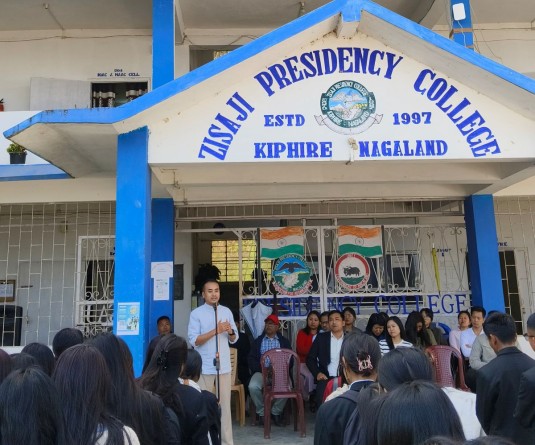Dr Pritpal Kaur Patra, SP Noklak inspecting the seed diversity display at the Biodiversity Festival at Pathso Nokeng. (Photo Courtesy: NEN)
NEN Biodiversity Festival stresses on indigenous knowledge and practices
DIMAPUR, MARCH 11 (MExN): “My people may look poor but we always have enough food in our kitchen; we may not be well-built but our stomachs are always full; we may be surrounded by stinging nettles but it is the source of our blanket and carpets, and the thorny shrubs provide us fruits to eat; our biodiversity is so rich that it will take more than a lifetime of a person to learn the names of all plants around us; our biodiversity feeds and sustain us,” a community elder Khomo, Head GB of Yokao village stated.
Yokao village is one of the 7 villages that participated at the Biodiversity Festival on March 10 at Pathso Nokeng in Noklak district, organised by North East Network (NEN) and hosted by Pathso Nokeng village.
The Biodiversity Festival at Pathso Nokeng was one of the 3 Biodiversity Festivals that NEN Nagaland has organised in March 2021 under the theme ‘Strengthening Indigenous Knowledge and Practices for a Sustainable Future.’
The 12th Edition of the NEN Biodiversity Festival kicked-off at Phor village on March 4 with 136 participants from Phor, New Phor, Shatüzha, Wuzu, Yisi, Küzatü, and Hutsü village. The Festival at Pathso Nokeng Village brought together around 250 participants from 7 villages from Pathso Nokeng, Pathso Village, Eakhao, Yokao, Tsuwao, Lengnyu village and Panso Town.
Guest Speaker Dr. Pritpal Kaur Patra, Superintendent of Police (SP), Noklak District in her address encouraged the farming communities to conserve their biodiversity, indigenous seeds, and continue the cultural practices which are sustainable while also adopting scientific knowledge.
“Farming is the best profession in the world, everything may stop working in the world but one cannot stop farming… If there are no farmers where would one get food?” stated Patra. She further emphasised on the importance of protecting the lands from chemical pesticides, and to protect indigenous local seeds. She encouraged the local communities to make Noklak, a frontier district take the lead in farming, marketing, value addition, handicrafts, handloom, etc through hard-work and collaborative effort with various departments.
Seno Tsuhah of North East Network in her keynote address asserted that indigenous traditional knowledge is one of the strongest fibres that bonds nature and human beings together. She called on the community to “defend one’s biodiversity and knowledge systems to ensure a sustainable future, and to build a strong and self-sufficient community by enhancing local production, local consumption and local distribution”.
At the Phor Festival on March 4, Wekoweu Tsuhah, State Coordinator, NEN, in her keynote speech highlighted that indigenous communities demonstrated their resilience and leadership in responding to the global COVID-19 pandemic because of their rich natural resources, biodiversity, traditional knowledge, practices and value systems. She emphasised on the need to assert one’s autonomy over food by strengthening traditional seed systems, local food production and consumption; to attain sustainable development by protecting common resources, inclusion and participation of women in decision making processes, redistribute care and domestic work, and strengthen the solidarity economy. At both locations in Phor and Pathso Nokeng, the Festival was imbued with cultural performances, seed exhibition and seed sharing, display of uncultivated crops, bamboo crafts and Biodiversity Markets by the participating communities.
Field Coordinator, NEN, Pongsa Lamthew, who was the key person in organising the event at Pathso Nokeng village stated that the Biodiversity Festival is the first of its kind in the Pathso Nokeng area, and it has generated wide awareness and greater interest on the importance of biodiversity conservation, value of traditional seeds and local food, and most importantly it built unity and solidarity amongst the villages of the area.
According to him, farmers and local artisans who brought their products to sell at the Biodiversity Market generated an amount of Rs 70,000 to 80000.
The NEN Biodiversity Festival is an annual event of NEN which is being held at Chizami village of Phek district since 2010. This year’s 12th NEN Biodiversity Festival will conclude on March 13 at Tsüpfüme Village.





